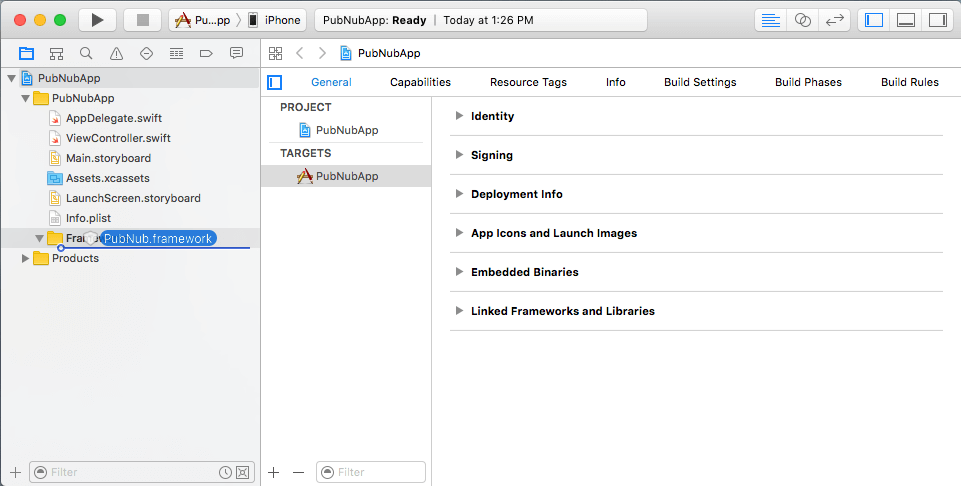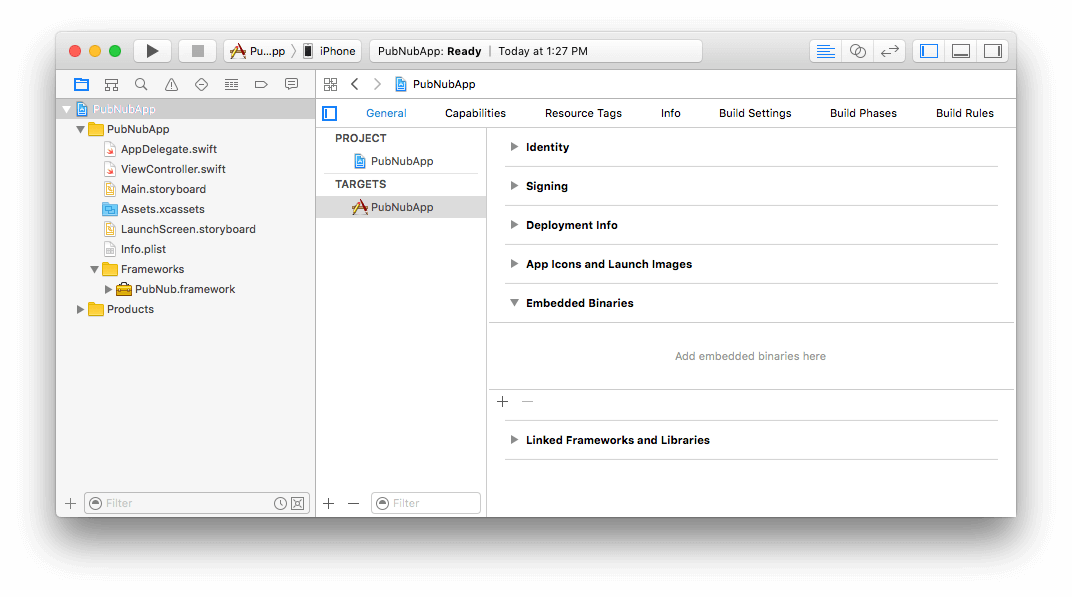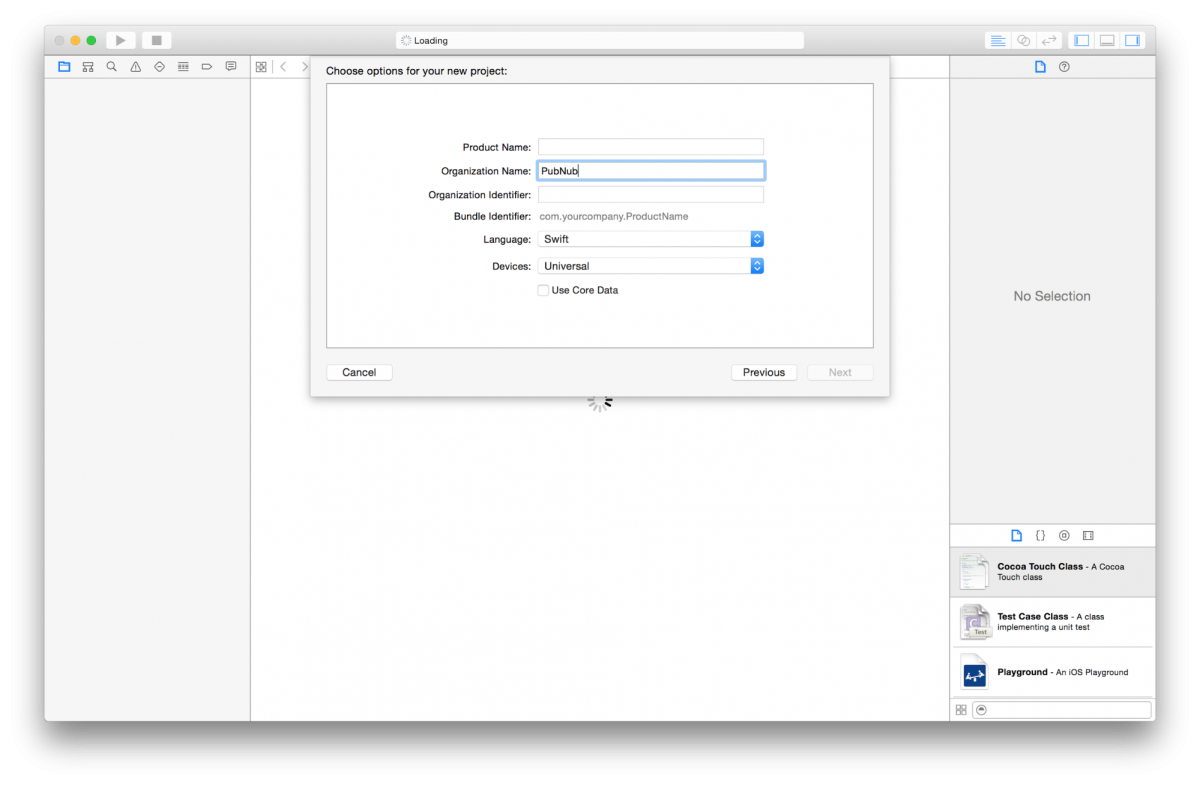Cocoa Swift API & SDK Docs 10.1.1
Unsupported SDK
PubNub no longer supports this SDK, but you are welcome to contribute.
This SDK has been replaced by a new PubNub Swift SDK written purely in Swift. See the PubNub Swift SDK documentation.
SDK version
Always use the latest SDK version to have access to the newest features and avoid security vulnerabilities, bugs, and performance issues.
Get code: CocoaPods
CocoaPods is a dependency manager and this is by far the easiest and quickest way to get started with PubNub SDK! (If you don't have pods installed yet you can check CocoaPods installation section for installation guide).
Be sure you are running CocoaPods 1.0.0 or above! You can install the latest cocopods gem:
1gem install cocoapods
If you've already installed you can upgrade to the latest CocoaPods gem using:
1gem update cocoapods
Get code: framework
The PubNub framework project allows you to build standalone framework bundles which can be copied right into your application.
To build the framework as a standalone bundle and integrate into project, perform the following:
-
Clone the PubNub master repository
1git clone git@github.com:pubnub/objective-c.git -
Navigate to root of the cloned repository
-
Run the CocoaPods pod install command to pull out all required dependencies
1pod install -
Open the
PubNub.xcworkspacefrom the PubNub repository in Xcode. -
Select the
FrameworkorUniversal Frameworktarget for target platform and hitCmd+Bto build the selected type of framework. -
Navigate to the
Frameworkdirectory and find theProductsdirectory. -
Drag&Drop
PubNub.frameworkbundle from theProductsdirectory to your application.
-
Select the
Copyitems if needed checkbox and clickFinish. -
Open your project's
Generaltab and scroll toEmbedded Binaries.
-
Click on
+and selectPubNub.frameworkfile.
PubNub-Universal
If the PubNub target has been used, then the framework will be generated only for the selected platform (device or simulator.) If you try to use the framework to compile for another platform, it will crash during run-time Using the PubNub-Universal build target (which can be used on both device and simulator) will help mitigate any sort of crash scenarios during development.
Now that these steps are complete, let's learn more about how to use the framework in your app.
Using the framework with your app
At this point, you should have the framework added to your application project, we'll need to make your project aware of the PubNub framework.
You need to import the PubNub module in files where it will be used.
1import PubNubSDK
Get code: Carthage
To build the framework as a standalone bundle and integrate into project, perform the following:
-
Install latest Carthage (if required).
-
Create a Cartfile any location can be used) or use existing file.
1touch Cartfile -
Add next line into a Cartfile which will allow to build framework bundles.
1github "pubnub/objective-c" ~> 4.1 -
Update and rebuild the project's dependencies (
updatecommand ensure what latestPubNubclient code will be used tobuildframework). build can be used if frameworks has been built before and it will be much faster becausegit clonewill be skipped.1carthage updateCommand above will build framework for all configured platforms, but if only one required it can be called like this
1carthage update --platform iosInstead of ios can be used:
mac,tvosorwatchos -
Navigate to the
Carthagedirectory and find theBuilddirectory. -
Navigate to directory which represent your target platform. For example:
iOS
-
Drag&Drop
PubNub.frameworkbundle from theProductsdirectory to your application.
-
Select the
Copyitems if needed checkbox and clickFinish. -
Open your project's
Generaltab and scroll toEmbedded Binaries.
-
Click on
+and selectPubNub.frameworkfile.
Using the framework with your app
At this point, you should have the framework added to your application project, we'll need to make your project aware of the PubNub framework.
You need to import the PubNub module in files where it will be used.
1import PubNubSDK
Get code: source
https://github.com/pubnub/objective-c/
Hello World
To include PubNub SDK in your project you need to use CocoaPods.
Install the CocoaPods gem by following the procedure defined above. To add the PubNub SDK to your project with CocoaPods, there are four tasks to complete:
-
Create new Xcode project.

-
Create a Podfile in your newly created Xcode project root folder
1touch Podfile -
The PubNub client can be added as module (only with a deployment target of OS X 10.9 and above)
1source 'https://github.com/CocoaPods/Specs.git'
2platform :osx, "10.9"
3use_frameworks!
4
5target 'application-target-name' do
6 pod "PubNub", "~> 4.1"
7endIf you have any other pods you'd like to include, or if you have other targets you'd to add (like a test target) add those entries to this Podfile as well. See the CocoaPods documentation for more information on Podfile configuration.
-
Install your pods by running
pod installvia the command line from the directory that contains your Podfile.
Work within the workspace
After installing your Pods, you should only be working within the workspace generated by CocoaPods or specified by you in Podfile. Always open the newly generated workspace file, not the original project file!
OS X 10.9 and above: Complete the application delegate configuration
If the project's deployment target is set to OS X 10.9 and above, you will need to import the module named AppDelegate.swift:
Required UUID
Always set the UUID to uniquely identify the user or device that connects to PubNub. This UUID should be persisted, and should remain unchanged for the lifetime of the user or the device. Not setting the UUID can significantly impact your billing if your account uses the Monthly Active Users (MAUs) based pricing model, and can also lead to unexpected behavior if you have Presence enabled.
1import Cocoa
2import PubNubSDK // <- Here is our PubNub module import.
Common to all OS X versions: Add the PNObjectEventListener protocol to the AppDelegate
1class AppDelegate: NSObject, NSApplicationDelegate, PNObjectEventListener {
2
3 // Stores reference on PubNub client to make sure what it won't be released.
4 var client: PubNub!
5
6 func applicationDidFinishLaunching(_ aNotification: Notification) {
7 ...
8 }
9}
Required UUID
Always set the UUID to uniquely identify the user or device that connects to PubNub. This UUID should be persisted, and should remain unchanged for the lifetime of the user or the device. If you don't set the UUID, you won't be able to connect to PubNub.
1// Initialize and configure PubNub client instance
2let configuration = PNConfiguration(publishKey: "demo", subscribeKey: "demo")
3self.client = PubNub.clientWithConfiguration(configuration)
4self.client.addListener(self)
5
6// Subscribe to demo channel with presence observation
7self.client.subscribeToChannels(["my_channel"], withPresence: true)
8
9// Handle new message from one of channels on which client has been subscribed.
10func client(_ client: PubNub, didReceiveMessage message: PNMessageResult) {
11
12 // Handle new message stored in message.data.message
13 if message.data.channel != message.data.subscription {
14
15 // Message has been received on channel group stored in message.data.subscription.
Copy and paste examples
In addition to the Hello World sample code, we also provide some copy and paste snippets of common API functions:
Init
Instantiate a new Pubnub instance. Only the subscribeKey is mandatory. Also include publishKey if you intend to publish from this instance, and the secret_key if you wish to perform Access Manager administrative operations from this Swift instance.
Secure your secretKey
It is not a best practice to include the secret key in client-side code for security reasons.
When you init with secret_key, you get root permissions for the Access Manager. With this feature you don't have to grant access to your servers to access channel data. The servers get all access on all channels.
Required UUID
Always set the UUID to uniquely identify the user or device that connects to PubNub. This UUID should be persisted, and should remain unchanged for the lifetime of the user or the device. If you don't set the UUID, you won't be able to connect to PubNub.
1let configuration = PNConfiguration(publishKey: "demo", subscribeKey: "demo")
2self.client = PubNub.clientWithConfiguration(configuration)
PubNub instance as variable
The PubNub instance should be placed as a variable in a long-life object (otherwise the PubNub instance will be automatically removed as an autoreleased object.)
1var client: PubNub!
Listeners
Add listeners
1/**
2 Subscription results arrive to a listener which should implement the PNObjectEventListener protocol and be registered as follows:
3 */
4self.client.addListener(self)
5self.client.subscribeToChannels(["my_channel1","my_channel2"], withPresence: false)
6
7// Handle a new message from a subscribed channel
8func client(_ client: PubNub, didReceiveMessage message: PNMessageResult) {
9 // Reference to the channel group containing the chat the message was sent to
10 let subscription = message.data.subscription
11 print("\(message.data.publisher) sent message to '\(message.data.channel)' at
12 \(message.data.timetoken): \(message.data.message)")
13}
14
15// Handle a subscription status change
Listener status events
This is the list of categories which can be received by an event listener:
| Category | Description |
|---|---|
PNAccessDeniedCategory | Subscribe request failed because of access error (active Access Manager). status.errorData.channels or status.errorData.channelGroups contain list of channels and / or groups to which user with specified auth key doesn't have access. |
PNDecryptionErrorCategory | Subscribe request returned messages which can't be decrypted with configured cipherKey. Unencrypted message will be returned in status.associatedObject where associatedObject is PNMessageData which contain channel and message properties. |
PNNetworkIssuesCategory | Subscribe request failed because there was no network connection at the moment when request has been sent. |
PNConnectedCategory | Subscribe request successfully completed and client connected to real-time data channels. |
PNReconnectedCategory | Subscribe request successfully completed and client has been reconnected to real-time data channels after unexpected disconnection (PNUnexpectedDisconnectCategory). |
PNDisconnectedCategory | Client did unsubscribe from specified real-time data channels. |
PNUnexpectedDisconnectCategory | Previously started subscribe loop did fail and at this moment client disconnected from real-time data channels. |
PNRequestMessageCountExceededCategory | If requestMessageCountThreshold is set, this status event will arrive each time when client receive more messages when it has been specified for PNConfiguration property. |
PNMalformedFilterExpressionCategory | Subscription request can't be processed by PubNub service because filter expression malformed and can't be evaluated. |
PNHeartbeatOperation | In case if presence heartbeat value is set, client will sent this status category at specified periods. If status.isError set to YES, it mean what heartbeat request did fail (potentially because of network issues). |
This is list of categories which can be received in API completion blocks (non-subscribe):
| Category | Description |
|---|---|
PNAcknowledgmentCategory | An API call was successful. This status has additional details based on the type of the successful operation. |
PNAccessDeniedCategory | Request failed because of access error (active Access Manager). status.errorData.channels or status.errorData.channelGroups contain list of channels and / or groups to which user with specified auth key doesn't have access. |
PNTimeoutCategory | Used API didn't received response from server in time. |
PNNetworkIssuesCategory | API did fail because there was no network connection at the moment when request has been sent. |
PNMalformedResponseCategory | Request received in response non-JSON data. It can be because of publish WiFi hotspot which require authorization or proxy server message. |
PNBadRequestCategory | Request can't be completed because not all required values has been passed or passed values has unexpected data type. |
PNDecryptionErrorCategory | Message Persistence API may return this status category in case if some messages can't be decrypted. Unencrypted message will be returned in status.associatedObject where associatedObject is PNMessageData which contain channel and message properties. |
PNTLSConnectionFailedCategory | TLS handshake issues and in most cases because of poor connection quality and packets loss and delays. |
PNTLSUntrustedCertificateCategory | Origin to which client tried to connect has untrusted certificate. |
Subscribe
Subscribe (listen on) a channel (it's async!):
1/**
2 Subscription results arrive to a listener which should implement the PNObjectEventListener protocol and be registered as follows:
3 */
4self.client.addListener(self)
5self.client.subscribeToChannels(["my_channel1","my_channel2"], withPresence: false)
6
7// Handle a new message from a subscribed channel
8func client(_ client: PubNub, didReceiveMessage message: PNMessageResult) {
9 // Reference to the channel group containing the chat the message was sent to
10 let subscription = message.data.subscription
11 print("\(message.data.publisher) sent message to '\(message.data.channel)' at
12 \(message.data.timetoken): \(message.data.message)")
13}
14
15// Handle a subscription status change
Event listeners
The response of the call is handled by adding a Listener. Please see the Listeners section for more details. Listeners should be added before calling the method.
Publish
Publish a message to a channel:
1self.client.publish("Hello from the PubNub Swift SDK", toChannel: "my_channel",
2 compressed: false, withCompletion: { (status) in
3
4 if !status.isError {
5
6 // Message successfully published to specified channel.
7 }
8 else{
9
10 /**
11 Handle message publish error. Check 'category' property to find
12 out possible reason because of which request did fail.
13 Review 'errorData' property (which has PNErrorData data type) of status
14 object to get additional information about issue.
15
Here now
Get occupancy of who's here now on the channel by UUID:
Requires Presence
This method requires that the Presence add-on is enabled for your key in the Admin Portal.
1// With .UUID client will pull out list of unique identifiers and occupancy information.
2self.client.hereNowForChannel("my_channel", withVerbosity: .UUID,
3 completion: { (result, status) in
4
5 if status == nil {
6
7 /**
8 Handle downloaded presence information using:
9 result.data.uuids - list of uuids.
10 result.data.occupancy - total number of active subscribers.
11 */
12 }
13 else {
14
15 /**
Presence
Subscribe to real-time Presence events, such as join, leave, and timeout, by UUID. Setting the presence attribute to a callback will subscribe to presents events on my_channel:
Requires Presence
This method requires that the Presence add-on is enabled for your key in the Admin Portal.
1/**
2 Subscription process results arrive to listener which should adopt to
3 PNObjectEventListener protocol and registered using:
4 */
5self.client.addListener(self)
6self.client.subscribeToPresenceChannels(["my_channel"])
7
8// New presence event handling.
9func client(_ client: PubNub, didReceivePresenceEvent event: PNPresenceEventResult) {
10
11 // Handle presence event event.data.presenceEvent (one of: join, leave, timeout, state-change).
12 if event.data.channel != event.data.subscription {
13
14 // Presence event has been received on channel group stored in event.data.subscription.
15 }
Event listeners
The response of the call is handled by adding a Listener. Please see the Listeners section for more details. Listeners should be added before calling the method.
History
Retrieve published messages from archival storage:
Requires Message Persistence
This method requires that Message Persistence is enabled for your key in the Admin Portal.
1self.client.historyForChannel("history_channel", withCompletion: { (result, status) in
2
3 if status == nil {
4
5 /**
6 Handle downloaded history using:
7 result.data.start - oldest message time stamp in response
8 result.data.end - newest message time stamp in response
9 result.data.messages - list of messages
10 */
11 }
12 else {
13
14 /**
15 Handle message history download error. Check 'category' property
Unsubscribe
Stop subscribing (listening) to a channel.
1/**
2 Subscription process results arrive to listener which should adopt to
3 PNObjectEventListener protocol and registered using:
4 */
5self.client.addListener(self)
6self.client.unsubscribeFromChannels(["my_channel1", "my_channel2"], withPresence: false)
7
8// Handle subscription status change.
9func client(_ client: PubNub, didReceive status: PNStatus) {
10
11 if status.operation == .unsubscribeOperation && status.category == .PNDisconnectedCategory {
12
13 /**
14 This is the expected category for an unsubscribe. This means there was no error in
15 unsubscribing from everything.
Event listeners
The response of the call is handled by adding a Listener. Please see the Listeners section for more details. Listeners should be added before calling the method.